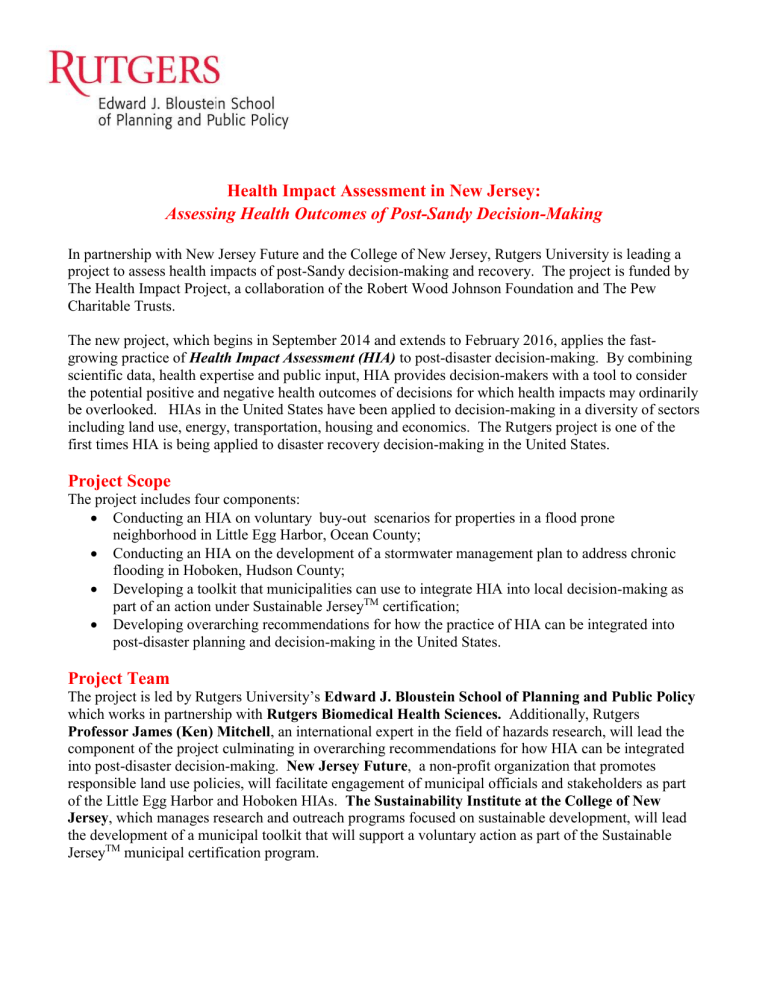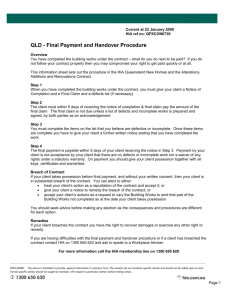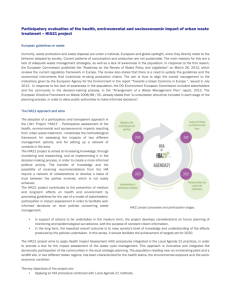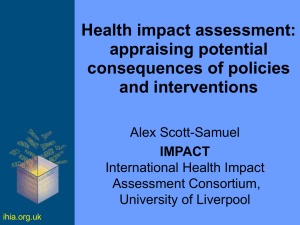Health Impact Assessment in New Jersey:

Health Impact Assessment in New Jersey:
Assessing Health Outcomes of Post-Sandy Decision-Making
In partnership with New Jersey Future and the College of New Jersey, Rutgers University is leading a project to assess health impacts of post-Sandy decision-making and recovery. The project is funded by
The Health Impact Project, a collaboration of the Robert Wood Johnson Foundation and The Pew
Charitable Trusts.
The new project, which begins in September 2014 and extends to February 2016, applies the fastgrowing practice of Health Impact Assessment (HIA) to post-disaster decision-making. By combining scientific data, health expertise and public input, HIA provides decision-makers with a tool to consider the potential positive and negative health outcomes of decisions for which health impacts may ordinarily be overlooked. HIAs in the United States have been applied to decision-making in a diversity of sectors including land use, energy, transportation, housing and economics. The Rutgers project is one of the first times HIA is being applied to disaster recovery decision-making in the United States.
Project Scope
The project includes four components:
Conducting an HIA on voluntary buy-out scenarios for properties in a flood prone neighborhood in Little Egg Harbor, Ocean County;
Conducting an HIA on the development of a stormwater management plan to address chronic flooding in Hoboken, Hudson County;
Developing a toolkit that municipalities can use to integrate HIA into local decision-making as part of an action under Sustainable Jersey
TM
certification;
Developing overarching recommendations for how the practice of HIA can be integrated into post-disaster planning and decision-making in the United States.
Project Team
The project is led by Rutgers University’s Edward J. Bloustein School of Planning and Public Policy which works in partnership with Rutgers Biomedical Health Sciences.
Additionally, Rutgers
Professor James (Ken) Mitchell , an international expert in the field of hazards research, will lead the component of the project culminating in overarching recommendations for how HIA can be integrated into post-disaster decision-making. New Jersey Future , a non-profit organization that promotes responsible land use policies, will facilitate engagement of municipal officials and stakeholders as part of the Little Egg Harbor and Hoboken HIAs. The Sustainability Institute at the College of New
Jersey , which manages research and outreach programs focused on sustainable development, will lead the development of a municipal toolkit that will support a voluntary action as part of the Sustainable
Jersey TM municipal certification program.
New Jersey Health Impact Collaborative
The Rutgers effort is being conducted under the umbrella of the New Jersey Health Impact
Collaborative ( www.njhic.rutgers.edu
). NJHIC is a network of organizations that are working to promote the consideration of health outcomes as part of planning and decision-making in New Jersey.
Facilitated by Rutgers University, NJHIC is working to enhance the practice of HIA in New Jersey through:
Outreach and education including hosting an inaugural statewide conference on May 7, 2015;
Demonstration Projects to inform specific decision-making and to illustrate the benefits of
HIA;
Training and education for students, HIA practitioners and decision-makers;
Analysis to identify policies in New Jersey that would benefit from HIA;
Development of tools for use by HIA practitioners in New Jersey;
Research to improve standards of HIA practice in New Jersey.
More about Health Impact Assessment
Health is determined by many factors: genetics, personal behavior, and access to affordable health care.
But more and more, Americans are understanding the important contribution of broader built, social and economic conditions, such as the safety of our streets, our ability to pay for safe housing, and how we commute to work contribute to our physical and mental health. Factors such as the cleanliness of the air we breathe and the water we drink, the proximity to outdoor and recreational opportunities, and our ability to afford and have access to fresh foods all have a major influence on personal health.
In general HIA follows a six-step process that relies on scientific and health-based data and research, and fully integrates stakeholders and decision-makers into its approach. The HIA analysis results in projections that predict the positive and negative health outcomes of a decision and that support recommendations on how to reduce risks and maximize positive health outcomes.
HIA practice has been more extensively developed in other areas of the United States. The mission of
NJHIC is to build capacity to expand use of HIA as part of decision-making related to policies and projects in New Jersey.






